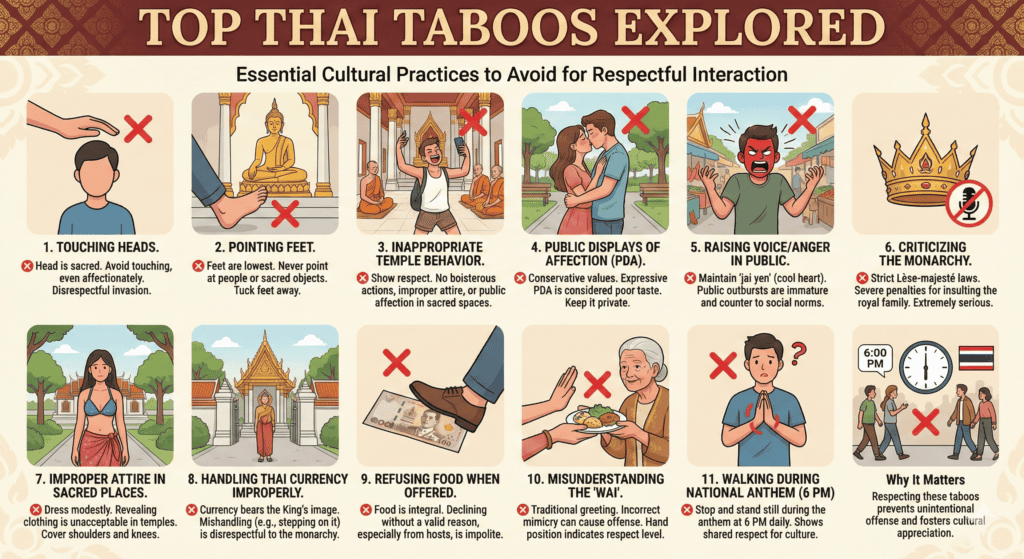Understanding the Thai Taboos (Things You MUST Know)
Thailand is renowned for being one of the most diverse and vibrant countries in Southeast Asia. Home to a fascinating culture, it is full of exciting attractions, experiences and people. However, navigating Thai society can be tricky – particularly when it comes to understanding some of the traditional taboos that are part of this unique culture.
From avoiding certain words or topics in conversation to wearing appropriate clothing, avoiding wearing certain colors or clothing items, there’s certainly much more going on than meets the eye! In this blog post we’ll take a closer look at some common Thai taboos and explain why you should be aware and respectful when visiting this remarkable nation.
Thai taboos include touching heads, pointing feet at people or sacred objects, inappropriate temple behavior, public displays of affection, displaying anger, criticizing the monarchy, improper attire in sacred places, mishandling currency, refusing offered food, and misunderstanding the ‘wai’ gesture. Disregarding these can offend locals and damage relationships.
Key Takeaways
- Thai taboos, deeply rooted in historical and religious contexts, play a significant role in everyday life and are essential to understand for anyone visiting or residing in Thailand.
- Ignoring or disrespecting these taboos can have serious social and legal consequences, affecting relationships, social standing, and overall experience in the country.
- Embracing local customs with an open mind and seeking local advice when uncertain are the keys to navigating thai people and culture respectfully.

Historical Context of Thai Taboos
The history of Thailand is intricately woven with cultural values, beliefs, and practices, among these strongly held norms, the Thai taboos, which hold significant sway in the society. Understanding the historical context of these taboos requires delving into various factors informing their existence and evolution over time, primarily the influence of Buddhism and the gradual transformation of norms across centuries.
Buddhism and Thai Culture
Undeniably, Buddhism plays a crucial role in shaping Thai culture, especially in creating its taboos. Buddhism was introduced in Thailand during the 3rd Century BC, and it has profoundly influenced virtually every aspect of Thai life since then. The Buddhist teachings of karma, the importance of moral conduct (sila), and mindfulness (sati) are reflected in various Thai taboos, providing a guide to Thai individuals on what to avoid to live a harmonic life that adheres to Buddhist precepts.
A notable Thai taboo influenced by Buddhism is the practice of not touching another person’s head. The head is regarded as the highest part of the body, spiritually and literally, hence sacred. Conversely, feet are considered the lowest and least pure part, and pointing them towards others or sacred images is frowned upon.
Evolution of Thai Norms
The evolution of Thai norms over the centuries is characterized by a complex, dynamic, and continual process of cultural assimilation, adaptation, and transformation. As Thailand interacted with different civilizations, both from the east and west, the Thai culture absorbed elements from these cultures, significantly impacting the evolution of its taboos.
The most pivotal periods of evolution were during the era of significant monarchs and the period of Western colonization. For instance, during the reigns of kings like Rama IV (King Mongkut) and Rama V (King Chulalongkorn) in the 19th and 20th centuries, Thailand embraced numerous reforms, leading to changes in social norms and relaxation of certain taboos.
A significant proportion of these changes came during the era of Western colonial intrusion. Though Thailand was never officially colonized, the influence was robust, leading to an adoption of several Western norms. These transformations, however, did not completely obliterate the core cultural norms and taboos, highlighting the deeply ingrained traditional values amongst Thais.
The historical context of Thai taboos is a fascinating study in cultural resilience, evolutionary adaptability, and spiritual core. Even as the culture and its taboos evolved, the underlying foundation rooted in Buddhism and tradition remained unshaken, characterizing the unique Thai cultural landscape.
The Thai Royale
In Thailand, there are two groups of people or objects that deserve utmost respect: the Thai Royal Family and those associated with Buddha, particularly Buddhist monks. These revered individuals are held in high regard and it is important to refrain from disrespecting them. Being unaware of local customs, it may come as a surprise that women are not allowed to make direct offerings to the monks and that the monks themselves have taken an oath to not touch women. Let us remember to honor and appreciate these traditions when in Thailand.
Top Thai Taboos Explored
Understanding Thai culture is not complete without grasping its taboos, practices that are significantly frowned upon or prohibited. Here, we examine some of these key Thai taboos.

Touching Someone’s Head
In Thai culture, the head is considered the most sacred part of the body, owing to its symbolic representation as the housing place of the spirit. As such, touching a thai person’s head, even in an affectionate manner, is seen as an invasion of personal space and deeply disrespectful.
Pointing Feet at People or Sacred Objects
Feet are deemed the least clean and the lowest body part in Thai culture. Therefore, pointing feet at people, especially towards monks or images of Buddha, is considered highly disrespectful. When sitting, especially in temples, Thais always tuck their feet away to avoid this taboo.
Inappropriate Temple Behavior
Temples are revered places in Thailand, requiring utmost respect and adherence to specific guidelines. Boisterous behavior, improper attire, or public displays of affection are seen as unacceptable forms of conduct within these sacred spaces. Always show due respect in temples and adhere to all posted rules.
Public Displays of Affection
Thai society retains its traditional, conservative values. Expressive displays of affection between couples, such as kissing, in public places are generally regarded as poor taste and taboo.
Raising One’s Voice or Showing Anger in Public
Public outbursts of anger or raising one’s voice is very much against the Thai social norm of maintaining “jai yen” (cool heart). Expressing anger openly is seen as immature and disrespectful. Thais value peace and emotional control.
Criticizing the Monarchy
Lèse-majesté laws in Thailand are stringent, with severe penalties for those who critique, insult, or defame the monarchy. It’s taken very seriously and breaking this taboo can lead to imprisonment.
Improper Attire in Sacred Places
Respecting the sanctity of sacred places involves dressing modestly. Revealing attire such as shorts, sleeveless tops, or beachwear is unacceptable in temples and other holy sites.
Handling Thai Currency Improperly
Thai currency is embossed with an image of the King. Mishandling (e.g., stepping on or defacing) it is viewed as disrespectful towards the monarchy.
Refusing Food When Offered
Food is an integral part of Thai culture. Declining it when offered, especially in domestic settings, is often considered impolite unless you have a valid reason.
Misunderstanding the ‘Wai’ Gesture
The ‘wai’ is a traditional Thai greeting involving a slight bow with palms pressed together. Misunderstanding or mimicking the gesture incorrectly can cause offense. The nature of the ‘wai’, including the hand position and the bow’s depth, indicates respect levels, differing when greeting peers, elders, or monks.
Knowledge of these taboos is necessary for anyone wishing to understand Thai culture or planning a visit to Thailand. It benefits not only the locals by respecting their culture but also the visitors by preventing them from unintentionally causing offense.
Walking While the National Anthem is Playing
Every day at 6:00 p.m., the National Anthem resonates through various places across Thailand. As the melody fills the air, a captivating moment unfolds. People from all walks of life, united by a profound respect, pause and stand still. In that fleeting instance, time seems to halt, transcending any urgency or obligations one may have. Regardless of personal circumstances, participating in this act of reverence reflects a shared appreciation for Thai culture and its rich traditions.
Implications of Ignoring Taboos
In any culture, ignoring or disrespecting taboos can have severe consequences, affecting relationships, social standing, and even legal ramifications. Thailand is no exception. This article explores the implications of disregarding Thai taboos and highlights potential consequences for tourists and expatriates.
Impact on Relationships and Social Standing
A clear understanding of Thai taboos is crucial when interacting with the locals. Disregarding these norms may create a negative impression and portray you as disrespectful, which may lead to strained relationships and being shunned by the community.
- Personal relationships: Ignoring Thai taboos can cause discomfort, tension, or even irreparable damage to friendships, romantic relationships, or business partnerships. Respecting taboos is essential to maintaining harmony and good interpersonal relationships.
- Professional relationships: The workplace is not exempt from the consequences of violating taboos. Disregarding these norms may hinder your ability to form alliances, collaborate effectively, or even advance in your career.
- Integration into Thai society: Disrespecting cultural norms can make it challenging to feel at home and accepted in the local community. Locals are less likely to trust or confide in someone who repeatedly disregards their culture’s taboos.
Real-life Consequences for Tourists and Expatriates
Tourists and expatriates should familiarize themselves with Thai taboos to avoid negative encounters, legal issues, or conflict during their visit.
- Offending locals: Breaking Thai taboos can result in disappointment, offense, or anger from locals, who may feel disrespected or hurt by such behavior. These feelings can turn a pleasant experience into an unpleasant one, compromising the overall enjoyment of your stay.
- Legal issues: Laws in Thailand are stringent, especially regarding lèse-majesté or defamation of the monarchy. Violation of such laws can lead to fines, imprisonment, or deportation.
- Damage to reputation: Word-of-mouth is powerful in local communities. Disregarding taboos can tarnish your reputation, making it difficult to find accommodations, and services, or make future visits to Thailand.
- Cultural insensitivity: Ignorance of Thai customs may lead to misunderstandings and accusations of cultural insensitivity. This can create friction between visitors and locals and contribute to unfavorable stereotypes.
Understanding and respecting Thai taboos is vital for anyone visiting or living in Thailand. Adhering to these cultural norms will significantly enhance your relationships, integration into Thai society, and overall experience in this incredible country.
Tips for Navigating Thai Culture Respectfully
Navigating a new culture can seem daunting, especially one richly layered and deep-rooted as Thai culture. However, with the right attitude and approach, you can enjoy an enriching and respectful cultural immersion. Here are some top tips on how you can navigate Thai culture conscientiously:
Embracing Local Customs and Traditions
- Adopt basic Thai greetings and expressions: Learning simple Thai phrases like “hello” (sawadee), “thank you” (khob khun), and “sorry” (khor thoad) can go a long way in showing respect for Thailand’s language and culture.
- Learn the ‘wai’ gesture: Understanding how and when to give the ‘wai’, a traditional Thai greeting, is key to demonstrating your respect for Thai customs. Remember, the gesture varies based on the social status of the person you’re greeting.
- Respect Thai dining etiquette: Try using a spoon and fork as Thais do, and be careful not to leave food or rice uneaten, as it’s seen as wasteful. Always accept food when offered, unless you have dietary restrictions.
- Adorn appropriate attire: Dress modestly, especially in sacred sites, and cover your shoulders and knees while visiting temples.
- Understand and respect Thai Buddhism: As the state religion practiced by the majority of Thais, understanding some basic tenets of Buddhism and respecting its practice can foster a deeper appreciation of Thai culture.
Seeking Local Advice When Uncertain
- Ask before acting: If you’re unsure about any cultural practice, don’t hesitate to ask locals. Thais are known for their friendliness and will be more than willing to help you understand their customs better.
- Learn from Thai friends or acquaintances: Learn local customs and practices through observation and friendly conversation with Thais. They can offer valuable insights into the nuances of their culture and acceptable behavior.
- Do some research: Before embarking on any cultural activity, it’s worth researching online or in guidebooks to understand its cultural significance and any associated taboos.
- Take part in Thai language and culture classes: If you plan to stay in Thailand for a while, consider enrolling in Thai language and culture classes. This will not only help you understand Thai culture on a deeper level but also demonstrate your respect and willingness to learn about their way of life.
By embracing local customs and traditions and seeking local advice when uncertain, you can navigate Thai culture respectfully, enhancing both your relationships with locals and your overall experience in Thailand.

Understanding the Thai Taboos FAQs
What is considered rude in Thai culture?
Some behaviors considered rude in Thai culture include pointing, touching someone’s head, speaking too loudly or aggressively, and public displays of affection.
What are unacceptable behaviors in Thailand?
Unacceptable behaviors in Thailand include lèse-majesté or defaming the monarchy, making jokes about religion, and speaking badly of someone’s family.
How do you show respect in Thai culture?
Showing respect in Thai culture is demonstrated through using polite language, avoiding physical contact with strangers, and adorning appropriate attire. Following local customs like the ‘wai’ gesture and learning basic Thai phrases can also show your respect for Thailand’s culture.
What are the consequences of violating taboos in Thailand?
Violating taboos in Thailand can result in disappointment, offense, or anger from locals, legal issues such as fines or imprisonment, harm to your reputation, and accusations of cultural insensitivity.
Conclusion
With Thailand’s rich culture and fascinating ancient customs, its taboos are an invaluable aspect to understand and fully appreciate the country. Being aware of such taboos will not only prevent any unnecessary situations from arising, but it will also allow travelers to truly experience Thailand and all it has to offer.
To take full advantage of living or visiting Thailand, one must always be mindful of cultural mores and mindful of their words and actions. A little bit of research, understanding, and respect in Thai culture goes a long way!
Subscribe to our newsletter for the best information about living in Thailand or reach out to us with questions—we’ll be happy to help you walk that extra mile when venturing into this magical country.






